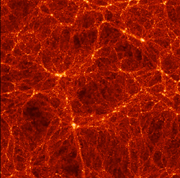


Weak gravitational lensing is a uniquely promising way to learn how much dark matter there is in the Universe and how its distribution has evolved since the distant past. New work by an international team led by cosmologist Alexie Leauthaud of Berkeley Lab's Physics Division has made major progress in extending the use of gravitational lensing to the study of much older and smaller structures than was previously possible. More>
 Employees are invited to attend an all-hands meeting hosted by Lab Director Paul Alivisatos on Thursday, Jan. 28, at 10 a.m. in the Building 50 Auditorium. He will discuss his strategic vision for the Lab, including the latest research and community-relations objectives, space planning goals, and the future of a multidisciplinary science initiative called Carbon Cycle 2.0. The meeting will also be webcast live; a link will be included in the Jan. 28 issue of Today at Berkeley Lab.
Employees are invited to attend an all-hands meeting hosted by Lab Director Paul Alivisatos on Thursday, Jan. 28, at 10 a.m. in the Building 50 Auditorium. He will discuss his strategic vision for the Lab, including the latest research and community-relations objectives, space planning goals, and the future of a multidisciplinary science initiative called Carbon Cycle 2.0. The meeting will also be webcast live; a link will be included in the Jan. 28 issue of Today at Berkeley Lab.
 The structure of a protein that helps relay electrical pulses between neurons has been fully mapped using the Lab's Advanced Light Source. This much-anticipated milestone could lead to new treatments for neurological diseases and a better understanding of how the nervous system works. The complete atomic-level architecture of the protein, called a glutamate receptor, caps more than 11 years of painstaking work by a team of scientists led by Eric Gouaux of the Oregon Health and Science University. More>
The structure of a protein that helps relay electrical pulses between neurons has been fully mapped using the Lab's Advanced Light Source. This much-anticipated milestone could lead to new treatments for neurological diseases and a better understanding of how the nervous system works. The complete atomic-level architecture of the protein, called a glutamate receptor, caps more than 11 years of painstaking work by a team of scientists led by Eric Gouaux of the Oregon Health and Science University. More>
 Employees interested in sharing engaging science activities with local students are invited to a series of workshops this spring. The first one, Color Analyzers, is for the 8th-grade level and takes place on Monday, Feb. 1, from 11:30 a.m. to 1:30 p.m. in Building 7-211. The workshops are part of the Lab’s Center for Science and Engineering Education Berkeley Lab in School Settings (BLISS) program. Registration is required and lunch will be provided. More>
Employees interested in sharing engaging science activities with local students are invited to a series of workshops this spring. The first one, Color Analyzers, is for the 8th-grade level and takes place on Monday, Feb. 1, from 11:30 a.m. to 1:30 p.m. in Building 7-211. The workshops are part of the Lab’s Center for Science and Engineering Education Berkeley Lab in School Settings (BLISS) program. Registration is required and lunch will be provided. More>
Employees who want to improve their time management skills or conduct more efficient meetings can participate in two webinars being offered by the Berkeley Lab Learning Institute on Wednesday, Feb. 3. Managing Your Time and Getting Things Done (BLI0132), from 11 a.m. to noon, will explore best practices for managing your workload and responding to changing priorities. Conducting Effective Meetings (BLI0131), from 1 to 2 p.m., will provide useful tips for planning meetings, handling challenging participants and keeping discussion on track. Registration is required.
The Lab’s Lockout-Tagout (LOTO) permit system was identified by the Department of Energy as a “Best Practice” in a recent Lessons Learned bulletin. A LOTO permit is required whenever a hazardous energy source is locked out. The system was developed by Keith Gershon of EH&S to satisfy several safety needs in a single format. Gershon developed a web-based form that helps ensure subcontractors, Lab points-of-contact, safety specialists, and facility managers all understand and agree on the hazards, controls, and utility configurations associated with a LOTO.
The Lab’s International Researchers and Scholars Office is hosting a Q&A session for employees, supervisors and others to learn more about visas, green card applications, work permits and other documents. The event will take place Monday at noon in Perseverance Hall (Building 54-130). Contact Ben Ortega for more information.
Today at Berkeley Lab encourages comments, suggestions, and story ideas. Please send them here.
TABL is produced by Public Affairs' Communications Group